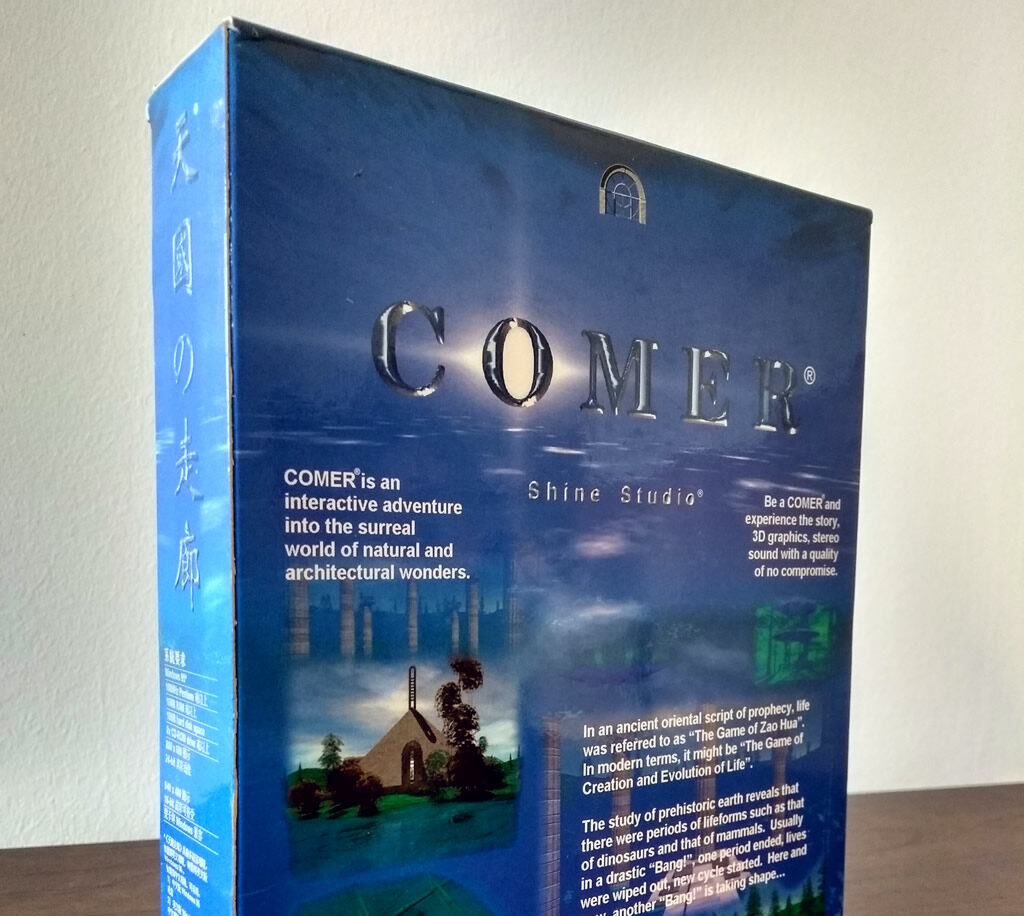Read about Kyle Choi’s Comer in ROMChip! 
Let’s end the year with something new and exciting: I’ve published an article in ROMchip: A Journal of Game Histories!
Over the summer, a reader sent me a rare physical copy of Comer, a spiritualist CD-ROM adventure game that was produced entirely by one person from Hong Kong. Not only did the designer Kyle Choi make it entirely by himself with no prior game development experience, but he manufactured and published it by himself as well. That was no small feat in 1998!
Comer is an extraordinarily weird game, and seeing a physical boxed copy of Comer drives home the fact it doesn’t fit into any standard mold of video game production. So where does it belong in gaming history? That’s the big question in my article, “The Long Silent Journey of Kyle Choi’s Comer,” which is now available in the latest issue of ROMchip.
ROMchip is the first academic journal dedicated to gaming history. It was a great experience to work with their editorial team, and I’m excited to have the opportunity to bring my perspective on the weird outliers of video game history to an academic publication. This is an open-access journal, which means anyone can read this article for free without needing to sign in or get a subscription.
Since this was written for an academic journal, it’s more formal than my usual writing, but I hope it’s still fun and interesting to read! And while you’re there, check out the rest of the issue, which includes an essay about using historical materials to understand game production, as well as article about reconstructing political games from 1980s Czechoslovakia.


Side of package writes “天國の走廊”, means “Heaven’s Corridor” in Japanese
(“走廊” means “Corridor” in Chinese).
But… Why do write in Japanese phrase at this side only?
It’s not fully shown in the picture, but the packaging for Comer is in two languages. Half the box is in English, and the other half is in Chinese (or possibly a mix of Chinese and Japanese, as you mentioned). It’s one of the reasons it’s such a unique and unusual game!
i really want to play this, is there ANY way remaining to obtain a copy?
For posterity’s sake and convience, here’s a link to the internet archive download of Comer, uploaded by Phil himself. Not sure why it isn’t linked in either of the articles.
https://archive.org/details/Comer_1998_ShineStudio
Although i did’t have a physical copy of this game,but accrooding to a image from moby games:
https://www.mobygames.com/images/covers/l/61750-comer-windows-front-cover.jpg
the proper chinese title for this game is”《天國走廊》”,
just like what VAN-Gluon has said,yes,in Chinese it also means Heaven’s Corridor.(you can’t denied that Chinese and Japanese have so much in commons in various ways.)
it might sounds weird,but the kana “の”(No) between 天國 and 走廊could just be meaningless and only serve for the vision design
https://en.wikipedia.org/wiki/No_(kana)#Usage
And what also make this game really special is that I can’t find any source of information about this game or Shine Studio(Kyle choi) in Chinese.
Thank you for documentary this game in the history!
Hey Phil,
Was wondering, how’d you get this to run? I’ve tried it on Win95, Win98 and WinXP VMs (using your archive dump) and in all 3 the game starts, then immediately asks me for disk 1, even though it’s in the virtual drive already.
Hi Crabbyson! So far I’ve only had success running Comer using PCem, not because of disc issues but because the audio is temperamental. Give that a shot and see if anything is different; I don’t remember that particular issue but I know Comer is especially hard to emulate for some reason.